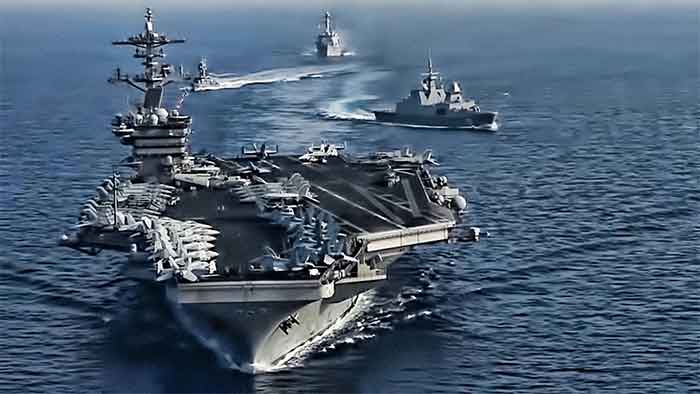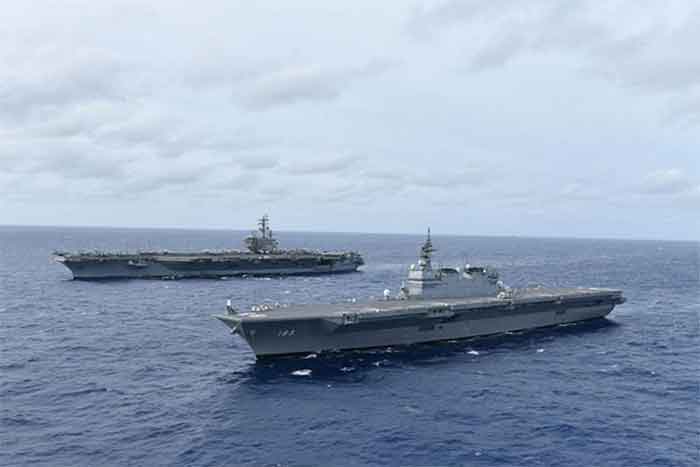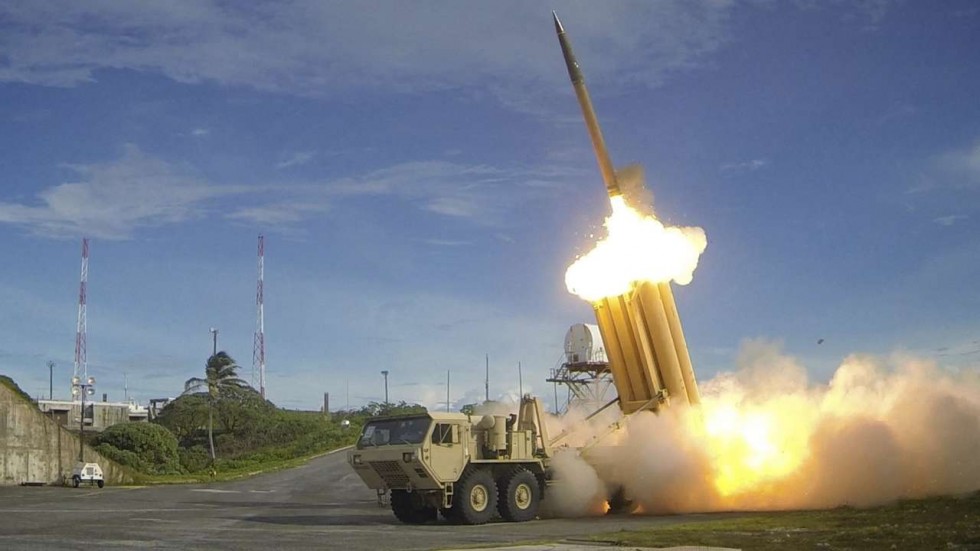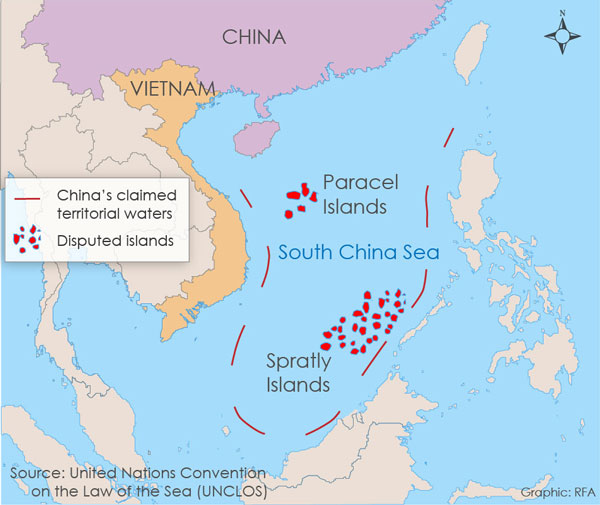Tensions are rising in the South China Sea. A Taipei, January 24, 2021 datelined Reuters report said:
A U.S. aircraft carrier group led by the USS Theodore Roosevelt has entered the South China Sea to promote “freedom of the seas”, the U.S. military said on Sunday, at a time when tensions between China and Taiwan have raised concern in Washington.
Citing a statement of the U.S. Indo-Pacific Command the report said:
The U.S. carrier strike group entered the South China Sea on Saturday, the same day Taiwan reported a large incursion of Chinese bombers and fighter jets into its air defense identification zone in the vicinity of the Pratas Islands.
The U.S. military said the carrier strike group was in the South China Sea, a large part of which is claimed by China, to conduct routine operations “to ensure freedom of the seas, build partnerships that foster maritime security.”
“After sailing through these waters throughout my 30-year career, it’s great to be in the South China Sea again, conducting routine operations, promoting freedom of the seas, and reassuring allies and partners,” Rear Adm. Doug Verissimo, commander of the strike group, was quoted as saying.
“With two-thirds of the world’s trade travelling through this very important region, it is vital that we maintain our presence and continue to promote the rules-based order which has allowed us all to prosper,” Verissimo said in the statement.
The announcement comes just days after Joe Biden was sworn in as U.S. president.
Biden’s nominee for secretary of state, Antony Blinken, told his Senate confirmation hearing on Tuesday there was “no doubt” China posed the most significant challenge to the U.S. of any nation.
China has repeatedly complained about U.S. Navy ships getting close to Chinese-occupied islands in the South China Sea, where Vietnam, Malaysia, the Philippines, Brunei and Taiwan all have competing claims.
The Theodore Roosevelt is being accompanied by the Ticonderoga-class guided-missile cruiser USS Bunker Hill, and the Arleigh Burke-class guided-missile destroyers USS Russell and USS John Finn, the U.S. statement said.
Another Taipei, January 21, 2021 datelined Reuters report – “Taiwan-Biden ties off to strong start with invite for top diplomat” – said:
Taiwan’s ties with its most important global backer the United States are off to a strong start under President Joe Biden’s government, after the island’s de facto ambassador attended an inauguration for the first time with an official invitation.
Former President Donald Trump’s administration ramped up support for Taiwan, increasing arms sales and sending senior officials to Taipei, angering China and stirring even greater enmity from Beijing towards Washington.
That had made Trump a popular figure in democratic Taiwan, which China views as its own territory, to be taken by force if needed, and raised concern in its government that Biden may not be as helpful.
The report cited Emily Horne, spokeswoman for the White House National Security Council: The U.S. commitment to Taiwan was “rock-solid” after the island’s de facto ambassador in Washington, Hsiao Bi-khim, attended Biden’s swearing in on Wednesday. “President Biden will stand with friends and allies to advance our shared prosperity, security, and values in the Asia-Pacific region – and that includes Taiwan.”
Taiwan’s foreign ministry said it was the first time an inauguration committee had formally invited the island’s Washington representative and showed the close friendship between Taiwan and the United States based on shared values. “These shared values are democracy, freedom and human rights,” said ministry spokeswoman Joanne Ou.
The U.S. ended formal diplomatic ties with Taiwan in 1979, switching recognition to China, though Washington is bound by law to provide Taiwan with the means to defend itself.
In a video message on her Twitter account, Hsiao, who is close to Taiwan President Tsai Ing-wen, said she was honored to be there representing Taiwan’s government and people.
“Democracy is our common language and freedom is our common objective,” she said.
Tsai sent her congratulations too, saying she hoped the two sides could work together to maintain regional democracy, freedom, peace and stability.
The U.S. secretary of state, Antony Blinken, said on Tuesday he was in favor of greater engagement with Taiwan.
Tsai met Blinken in 2015 at the State Department when he was deputy secretary of state and she was the presidential candidate for Taiwan’s Democratic Progressive Party.
Earlier, a United Nations, January 22, 2021 datelined AP report – “Outgoing US ambassador says world must end Taiwan’s exclusion” – said:
In a final swipe at China, the Trump administration’s outgoing UN ambassador tweeted that it is time for the world to oppose China’s efforts to exclude and isolate Taiwan, drawing sharp criticism from Beijing.
To make the point even more graphic, Ambassador Kelly Craft accompanied the tweet with a photo of herself in the UN General Assembly Hall where the island is banned. She also carried a handbag with a stuffed Taiwan bear sticking out of the top, a gift from Taiwan’s representative in New York, Ambassador James Lee.
Taiwan left the United Nations in 1971 when China joined. Beijing considers Taiwan a renegade province.
U.S. relations with Taiwan warmed under president Donald Trump, largely due to strong bipartisan support in Congress, but also because his administration was willing to defy Beijing’s threats and promote Taiwan as an alternative to Chinese Communist Party authoritarianism.
Craft met in September with Taiwan’s New York representative and had been scheduled to visit Taipei last week, but her trip was canceled after then secretary of state Mike Pompeo banned all travel.
Undeterred, she held a virtual meeting with Taiwan’s President Tsai Ing-wen on the evening of Jan. 13, telling her: “The United States will always stand with Taiwan.”
Earlier that day, she went into the General Assembly Hall, stood at the speaker’s podium, and recorded a virtual address to Model U.N. students in Taiwan.
Craft followed up those events with a statement Tuesday — her last full day as ambassador — stressing that the United States “is determined to end” Taiwan’s exclusion and isolation, and predicting this will continue with the administration of newly inaugurated President Joe Biden.
“The U.S. position on this matter enjoys universal bipartisan support,” she said, “and so, even as the United States is preparing for a transition, I can speak with great confidence that the U.S.-Taiwan relationship will continue to grow and strengthen.”
She called Taiwan “a force for good on the global stage – a vibrant democracy, a generous humanitarian actor, a responsible actor in the global health community, and a vigorous promoter and defender of human rights.”
In a final salvo during Trump’s final hours in office on Wednesday, Craft tweeted her appeal for an end to Taiwan’s isolation and exclusion, saying: “All @UN member states should recognize the benefits of Taiwan’s meaningful participation in int’l organizations & the damage done by its continued exclusion.”
The spokesperson for China’s UN Mission, referring to Craft’s photo in the General Assembly Hall, tweeted back: “Without prior notice to the UN, you sneaked into the GA Hall to record the video. You have not only violated the guidelines for the use of UN premises but also broken the rules for prevention of COVID-19. You are spreading virus literally. Time to stop!”
A spokesperson for Craft responded Thursday saying: “Ambassador Craft was proud to speak with the youth of Taiwan from the floor of the UN General Assembly, to underscore the outrageous fact that Taiwan’s voice remains unwelcome in that Hall.”
In her speech to Taiwan’s Model UN, Craft told the students: “Stay firm, say the words of democracy even in the wake of this moment. Because one day, you, too, will be standing here.”
To reinforce her personal commitment, she ended her statement on Tuesday saying: “As my posting at the U.N. comes to a close, my mission will not be complete until the people of Taiwan have a voice.”
An August 15, 2020, Shanghai datelined Reuters report – “U.S. Navy carrier conducted exercises in South China Sea on Aug. 14” – said:
A U.S. Navy aircraft carrier conducted exercises in the contested South China Sea on Friday, the U.S. navy said in a statement.
A strike group led by the USS Ronald Reagan conducted flight operations and high-end maritime stability operations and exercises, the statement said.
“Integration with our joint partners is essential to ensuring joint force responsiveness and lethality, and maintaining a free and open Indo-Pacific,” U.S. Navy Commander Joshua Fagan, Task Force 70 air operations officer aboard USS Ronald Reagan, was quoted as saying.
The drill comes amid heightened tensions between the United States and China. Washington has criticized Beijing over its novel coronavirus response and accuses it of taking advantage of the pandemic to push territorial claims in the South China Sea and elsewhere.
China has objected to such exercises and said the U.S. rejection of its claims in the South China Sea has raised tension and undermined stability in the region.
Sanctions on former U.S. cabinet members send powerful message
China has displayed firm resolution to defend its national interests and demonstrate the fact that any person and action that harms China’s interests will have to face the consequences.
According to a statement of the Chinese Ministry of Foreign Affairs, as U.S. President Joe Biden took the oath of office, China quickly announced sanctioning of more than two dozen officials and members of former president Donald Trump’s cabinet for having “seriously violated” China’s sovereignty. The sanctions are unprecedented given the number of those sanctioned, their high-ranking positions in the Trump administration and stringent measures against them. The message it has sent is quite clear and strong: A message that you cannot damage China’s sovereign interests without paying any price. There could be diplomatic frictions and conflicts between countries, but no bottomless acts that cross the line will be allowed.
The sanctioned U.S. officials include former secretary of state Mike Pompeo, Trump’s national security adviser Robert O’Brien, deputy national security advisor Matthew Pottinger, and trade advisor Peter Navarro.
Those on the sanctions list have a bad record in trampling on basic norms when dealing with China. In the past four years, they have promoted a series of frenzied acts against China. They have also brazenly interfered in China’s domestic issues, fabricating lies, making accusations and conspiracies about sovereignty-related issues such as Hong Kong, Xinjiang and the island of Taiwan. What they have done undermined China’s interests, offended the Chinese people and seriously disrupted China-US relations.
The message China likes to convey is that U.S. anti-China politicians and officials must be clear: They cannot leave unscathed after violating China’s sovereign interests and spoiling China-US relations whether they are for private benefits, out of ideological prejudice or the needs of a domestic partisan struggle. On one hand, politicians that have crossed China’s line should bear the consequences for their anti-China actions. On the other, China needs to use sanctions to deter those who want to make trouble for China. US officials and politicians cannot be allowed to make a profit from China while attacking China.
China’s step will have consequence as there is Washington’s “revolving door” – senior officials will be hired by companies, NGOs, or think tanks after they leave the government. China’s sanctions, like a sword of Damocles hanging over their heads, will force those entities having businesses and cooperation with China to think twice whether they should develop relations with those former Trump administration officials.
This is not the first time China has sanctioned U.S. politicians. But it is the first time China imposed sanctions on the U.S. side not as a tit-for-tat move. Previously, China only carried out reciprocal sanctions on U.S. politicians and officials as a counterstrike to U.S. sanctions first imposed on China. But this time, it indicates China has been determined enough to take sanctions proactively as a means to defend its interests.
China likes to show that although it champions cooperation, but that does not mean China has to swallow the insults without doing anything after one damages China’s core interests, and China is not a paper tiger. China’s move this time should be a wake-up call for anti-China forces within the U.S. as well as China hawks within the new Biden administration. They should draw a lesson from their predecessors in the Trump administration.
China conducts military flights in Taiwanese airspace
Another report said:
It is not unusual for China to conduct military flights between the southern part of Taiwan, which it claims as its territory — and the Taiwan-controlled Pratas Islands in the South China Sea, Reuters reports. In fact, the flights have occurred on a daily basis in recent months. But what happened Saturday does appear out of the ordinary.
Eight nuclear-capable Chinese bombers and four fighter jets entered the southwestern corner of Taiwan’s air defense identifications zone, Taiwan’s defense ministry said. Normally, China deploys just one or two reconnaissance aircraft at a time, so Saturday’s event was somewhat startling. Taiwan’s air force was able to warn the aircraft away and deployed missiles to monitor them.
While there has been no word from Beijing yet, the move comes at a time when tensions between China and the U.S. are rising, with Washington’s strengthening support for Taiwan playing a significant role.
IF YOU LIKED THE ARTICLE SUPPORT PEOPLE’S JOURNALISM















































